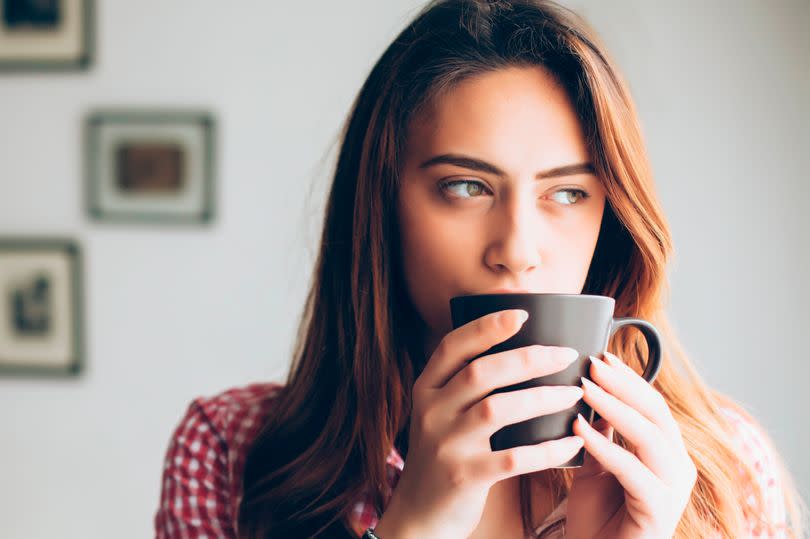Three ways to boost your energy without drinking coffee – according to experts

The UK gets through a whopping 98 million cups of coffee a day, according to BCA's estimates.
But drinking too much can leave you feeling jittery, anxious and even nauseous. That's why experts recommending switching out the caffeine-heavy beverage for energy-boosting alternatives from time to time.
These alternatives will not only provide a much-needed pick-me-up, but can also have added health benefits. Rowan Connell, Chief Medical Officer at Benenden Health, explained: "While there’s nothing wrong with reaching for the coffee pot for a quick pick-me-up, there's a limit to the amount of caffeine you should consume per day.
"You should not consume more than 400mg of caffeine per day - which is about the same as six instant coffees. If you regularly consume an excessive amount of caffeine, it can lead to symptoms such as trouble sleeping, digestive issues, high blood pressure, and increased feelings of anxiety."
1. Meals and snacks
At the surface, oats, sweet potatoes and rice may not seem too similar. But all three foods contain crucial 'complex carbohydrates' which steadily release energy through our bodies when consumed.
This differs to the simple carbohydrates found in sweets, sugary snacks and even breakfast cereals which are digested and absorbed quickly. Topping up on these may lead to a dramatic blood sugar spike, triggering a rush of energy, followed by a sudden crash.
You may feel more worn out as a result. The expert added: "You can increase vitamin C in your diet by eating more fruit and vegetables, such as oranges, apples, broccoli, and strawberries. This energy-boosting vitamin contributes to the functioning of your metabolism, helping to reduce fatigue."
2. Drinks
It may seem like common sense, but swapping coffee for tea can significantly reduce your jitteriness. According to Harvard University, instant and brewed coffee contain around 60mg and 95mg of caffeine respectively.
Meanwhile, black tea has approximately 47mg and green tea has 28mg. This doesn't apply to TikTok trendy matcha tea beverages however, which can hold between 40 and 175mg of caffeine per cup.
Experts at MUD\WTR UK also explained: "Herbal teas are caffeine free, but that doesn’t mean they can’t promote alertness. In fact, research shows teas support energy levels by nourishing the body. Even the act of making a herbal tea can help wake someone up in the morning.
"Peppermint tea, for example, been found to support digestion and improve cognitive function. The same can be said for ginger tea, which helps oxygen circulate around the body, therefore giving people more energy throughout the day.
"Cocoa beans are also ideal for people looking to cut back on coffee. They contain theobromine, a natural stimulant which increases energy slowly throughout the day – just like caffeine, although cocoa beans aren’t addictive and as short-lived."
3. Exercise
It may seem somewhat paradoxical, but increasing your physical activity can actually elevate your energy levels. The NHS suggests a mere 15-minute walk each day can provide this energy boost, while also improving your sleep at night.
Rosey Davidson, a leading sleep consultant at Just Chill Baby Sleep, previously told The Mirror: "Exercise plays a key role in promoting better sleep, through its positive impact on both physical and mental health.
"Engaging in regular physical activity helps regulate the body's internal clock - circadian rhythm - which governs the sleep-wake cycle. Exercise can reduce cortisol (our stress hormone) and release of endorphins, which are natural mood lifters. Both of these things will contribute to a better night's sleep."
While there isn't a strict number of steps or ideal work duration required to achieve optimal levels of sleep, Rosey recommends just being as active as possible within reason. She continued: "Getting our steps outside, in the natural light, is far more likely to have a positive impact on our sleep too - with the added bonus of getting in some Vitamin D.
"There are other things we can do to tweak our sleep environment - bedding, temperature, banning tech - but exercise will directly affect our bodies on a physiological level. The best approach to sleep challenges will consider all aspects of health."
What do you think? Let us know in the comment section below

 Yahoo News
Yahoo News 
